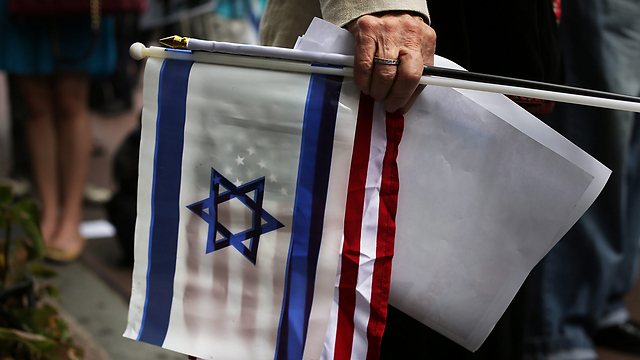
Israel support rally in New York
צילום: AFP
American Jews’ declining attachment to Israel
Controversial moves made by the Israeli government, increasing rates of intermarriage and the fact that Reform and Conservative Jews are not recognized by the Chief Rabbinate (making it harder for them to marry or divorce) all lead to weakening ties of American Jewry to Israel.
More and more American Jews, especially millennials, are far less attached to Israel than their parents were, a situation that has both Israeli officials and American Jewish leaders concerned about the future. The intensifying trend comes as President Donald Trump begins his time in the White House, while some in Israel are calling for controversial moves such as annexing part or all of the West Bank, which could deepen liberal American Jews’ alienation.
“Many young Jews around the world have stopped talking about Israel,” Tamar Zandberg, a Knesset member from the dovish Meretz party, told The Media Line. “In the past, Israel was always an issue of consensus, then an issue of debate, and now it is not an issue.”
She says the reasons are both political and religious. “There is a feeling that the State of Israel is abandoning the support of Jewish communities around the world, both by not acknowledging other streams of Judaism, and by shutting our ears in Israel to the criticism and discontent that sometimes exists on Israel’s policy in the West Bank.”
One oft-repeated joke in Israel is that “the synagogue I don’t go to is Orthodox.” In Israel, Orthodox Judaism has a monopoly on issues of personal status including marriage and divorce.
Although a majority of Israelis define themselves as “secular,” they observe many Jewish traditions and are willing to get married by an Orthodox rabbi so their marriage would be recognized in Israel.
In the US, about half of American Jews identify as either Reform (35 percent) or Conservative (18 percent), according to the Pew Research Center’s most recent survey on the matter. In Isael, the survey found, only five percent say they are Reform or Conservative, while half identify with Orthodoxy, even if they are not scrupulously observant themselves. About 40 percent of Israelis said they did not identify with any stream of Judaism.
Israel defines anyone who has a Jewish mother or was converted by an Israeli-approved Orthodox rabbi, as Jewish, meaning they can marry in Israel.
“More and more American Jews know another American Jew who was not able to marry in Israel or whose rights were somehow circumscribed in a way that American Jews can’t even begin to understand,” Jonathan Sarna, a professor of American Jewish history at Brandeis University, told The Media Line. “Jews are less than two percent in America, and yet Jews have extraordinary rights. It’s hard for them to understand why Reform or Conservative Jews are not given religious equality in Israel.”
One issue of contention has been the right of Reform and Conservative women to read Torah at the Western Wall, known in Hebrew as the Kotel. Women trying to do so have been attacked, and their Torah scrolls confiscated. The Israeli Supreme Court this month indicated that it will soon rule to allow women to read from the Torah at the women’s section of the Western Wall plaza.
The court gave the rabbi of the Western Wall, Shmuel Rabinowitz, 30 days to respond why that should not become the new policy.
Some American Jewish analysts say that part of the diminished attachment is because of the rising rate of intermarriage. Among non-Orthodox Jews, a whopping 72 percent have gentile spouses, according to the Pew survey.
“I wouldn’t call it a rift but there is definitely a diminished attachment to Israel,” Steven M. Cohen, Professor of Jewish Social Policy at Hebrew Union College-Jewish Institute of Religion, told The Media Line. “The reason fewer young people care about Israel is that there are fewer young Jewish people. The children of intermarriages are less attached to being Jewish and especially less attached to Israel.”
Some of that is being countered by Birthright, a program that brings young Jews between the ages of 18 and 26 to Israel for free ten day trips. Cohen says that after Birthright, there is a spike in connection to Israel, but if the participants do not come back to Israel, the “Brthright effect” gradually wanes.
The increasingly tenuous connection between millennial American Jews and Israel has people on both sides concerned. Some fear that US financial support for Israel could waver without strong support from American Jews.
“I am convinced that without the pressure of the American Jewish community the US would support Israel but not to the degree that it does,” Dov Zakheim, the chairman of the Jewish Religious Equality Coalition of the American Jewish Committee and a former senior US Defense official, told The Media Line. “Most Israelis think President Obama is no friend of Israel, but he just committed nearly $40 billion for ten years. Why did he do it? It wasn’t just because of the evangelical Christians. If the Jewish community had not been active in support of this, I doubt he would have done this.”
Article written by Linda Gradstein.
Reprinted with permission from The Media Line











